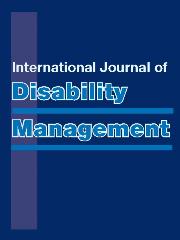Article contents
The Workers' Compensation Experience: A Qualitative Exploration of Workers' Beliefs Regarding the Impact of the Compensation System on Their Recovery and Rehabilitation
Published online by Cambridge University Press: 23 February 2012
Abstract
Attempts to develop a better understanding of the interaction between the compensation environment and injured workers suggest that the compensation environment may negatively impact on the psychological wellbeing of injured workers. This study offers a complementary perspective to contemporary quantitative studies exploring the psychosocial aspects of workplace injury and disability, and contributes to the growing body of qualitative data on the interaction of personal and environmental factors influencing recovery from work injury. The beliefs and experience of injured workers, as explored through ethnographic interviewing, offer insight to the social meaning and relationships comprised in the compensation environment and reveal the pervasive impact of workplace injury across personal, social and occupational spheres. Poor claims administration and hostile interpersonal interactions are identified as particular sources of frustration and discontent for injured workers. Strong themes of perceived injustice emerge as a potentially valuable area for future research in improving the outcomes of compensable injury.
- Type
- Articles
- Information
- International Journal of Disability Management , Volume 4 , Issue 2 , 01 September 2009 , pp. 19 - 26
- Copyright
- Copyright © Cambridge University Press 2009
- 7
- Cited by


